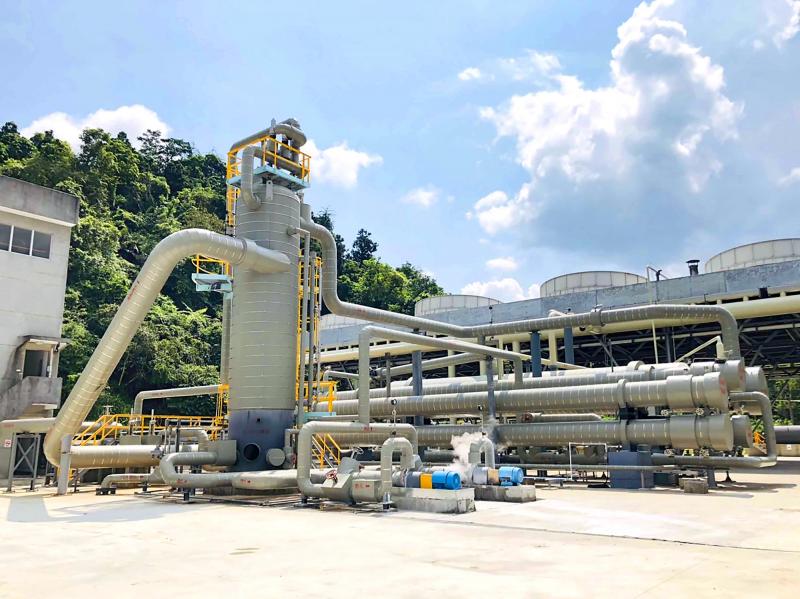The Cingshuei Geothermal Power Plant, the first privately built geothermal plant in Taiwan, is set to obtain a commercial license by the end of this month.
The 4.2 megawatt (MW) plant in Yilan County would generate enough electricity to power 10,000 households and has potential for expansion to further utilize the area’s geothermal resources.
Yilan has long been recognized as having the greatest potential for geothermal energy generation in Taiwan, with hot springs in the area bubbling so hot that tourists boil eggs in them.

Photo courtesy of Yilan County Government via CNA
State-run Taiwan Power Co (台電) has since the 1980s sponsored a 3MW plant in Cingshuei, but the project ran into trouble due to corrosion and silt blockage, and was eventually abandoned.
The current project, developed by Fabulous Power Co (結元能源開發), imported equipment from Nevada-based Ormat Technologies Inc.
The plant extracts water with temperatures of up to 180°C from 1,200m to 2,100m underground and runs it through a heat exchanger to generate electricity, before pumping it back into the ground again.
“The plant takes the heat, but not the water,” the Yilan County Government said in a press release.
Fabulous Power won the right to use the land occupied by the failed pilot plant in 2017, the county government said.
Fabulous Power president Lin Bo-hsiu (林伯修) last month told the Chinese-language Business Today magazine that he never gave up hope.
“People told me the energy just wasn’t there, but for eight years I went from well to well, and I studied different methods and different equipment,” Lin said.
Lin said that the 4.2MW generation capacity is just the beginning.
He estimated there was 30MW to 60MW of power generation potential in the Chingshuei area alone.
Reliable geothermal energy could be a perfect complement to other alternative energy sources such as solar and wind, which generate power only intermittently, he said.

Sweeping policy changes under US Secretary of Health and Human Services Robert F. Kennedy Jr are having a chilling effect on vaccine makers as anti-vaccine rhetoric has turned into concrete changes in inoculation schedules and recommendations, investors and executives said. The administration of US President Donald Trump has in the past year upended vaccine recommendations, with the country last month ending its longstanding guidance that all children receive inoculations against flu, hepatitis A and other diseases. The unprecedented changes have led to diminished vaccine usage, hurt the investment case for some biotechs, and created a drag that would likely dent revenues and

Global semiconductor stocks advanced yesterday, as comments by Nvidia Corp chief executive officer Jensen Huang (黃仁勳) at Davos, Switzerland, helped reinforce investor enthusiasm for artificial intelligence (AI). Samsung Electronics Co gained as much as 5 percent to an all-time high, helping drive South Korea’s benchmark KOSPI above 5,000 for the first time. That came after the Philadelphia Semiconductor Index rose more than 3 percent to a fresh record on Wednesday, with a boost from Nvidia. The gains came amid broad risk-on trade after US President Donald Trump withdrew his threat of tariffs on some European nations over backing for Greenland. Huang further

Macronix International Co (旺宏), the world’s biggest NOR flash memory supplier, yesterday said it would spend NT$22 billion (US$699.1 million) on capacity expansion this year to increase its production of mid-to-low-density memory chips as the world’s major memorychip suppliers are phasing out the market. The company said its planned capital expenditures are about 11 times higher than the NT$1.8 billion it spent on new facilities and equipment last year. A majority of this year’s outlay would be allocated to step up capacity of multi-level cell (MLC) NAND flash memory chips, which are used in embedded multimedia cards (eMMC), a managed

CULPRITS: Factors that affected the slip included falling global crude oil prices, wait-and-see consumer attitudes due to US tariffs and a different Lunar New Year holiday schedule Taiwan’s retail sales ended a nine-year growth streak last year, slipping 0.2 percent from a year earlier as uncertainty over US tariff policies affected demand for durable goods, data released on Friday by the Ministry of Economic Affairs showed. Last year’s retail sales totaled NT$4.84 trillion (US$153.27 billion), down about NT$9.5 billion, or 0.2 percent, from 2024. Despite the decline, the figure was still the second-highest annual sales total on record. Ministry statistics department deputy head Chen Yu-fang (陳玉芳) said sales of cars, motorcycles and related products, which accounted for 17.4 percent of total retail rales last year, fell NT$68.1 billion, or